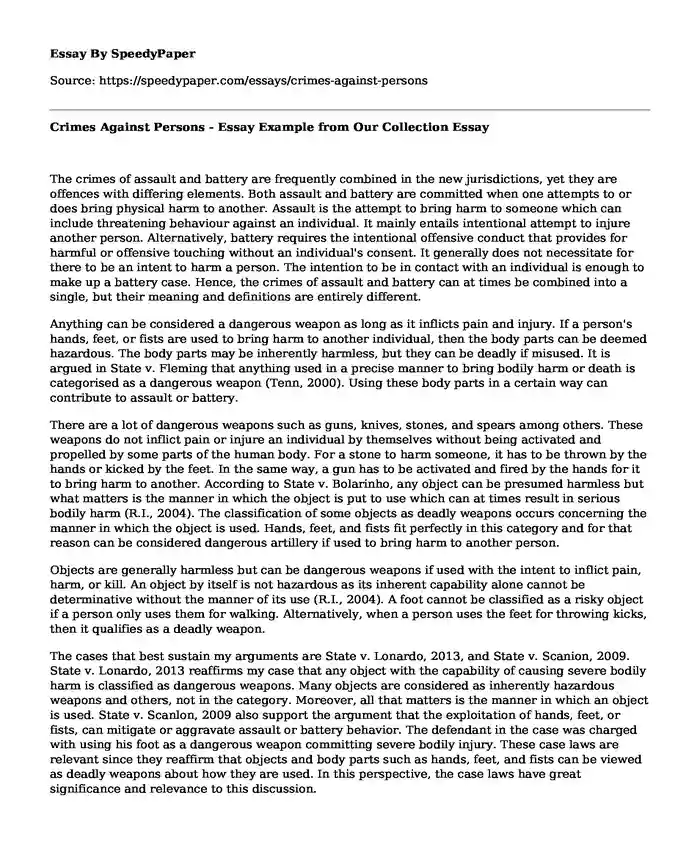
| Type of paper: | Essay |
| Categories: | Criminal law |
| Pages: | 3 |
| Wordcount: | 675 words |
The crimes of assault and battery are frequently combined in the new jurisdictions, yet they are offences with differing elements. Both assault and battery are committed when one attempts to or does bring physical harm to another. Assault is the attempt to bring harm to someone which can include threatening behaviour against an individual. It mainly entails intentional attempt to injure another person. Alternatively, battery requires the intentional offensive conduct that provides for harmful or offensive touching without an individual's consent. It generally does not necessitate for there to be an intent to harm a person. The intention to be in contact with an individual is enough to make up a battery case. Hence, the crimes of assault and battery can at times be combined into a single, but their meaning and definitions are entirely different.
Anything can be considered a dangerous weapon as long as it inflicts pain and injury. If a person's hands, feet, or fists are used to bring harm to another individual, then the body parts can be deemed hazardous. The body parts may be inherently harmless, but they can be deadly if misused. It is argued in State v. Fleming that anything used in a precise manner to bring bodily harm or death is categorised as a dangerous weapon (Tenn, 2000). Using these body parts in a certain way can contribute to assault or battery.
There are a lot of dangerous weapons such as guns, knives, stones, and spears among others. These weapons do not inflict pain or injure an individual by themselves without being activated and propelled by some parts of the human body. For a stone to harm someone, it has to be thrown by the hands or kicked by the feet. In the same way, a gun has to be activated and fired by the hands for it to bring harm to another. According to State v. Bolarinho, any object can be presumed harmless but what matters is the manner in which the object is put to use which can at times result in serious bodily harm (R.I., 2004). The classification of some objects as deadly weapons occurs concerning the manner in which the object is used. Hands, feet, and fists fit perfectly in this category and for that reason can be considered dangerous artillery if used to bring harm to another person.
Objects are generally harmless but can be dangerous weapons if used with the intent to inflict pain, harm, or kill. An object by itself is not hazardous as its inherent capability alone cannot be determinative without the manner of its use (R.I., 2004). A foot cannot be classified as a risky object if a person only uses them for walking. Alternatively, when a person uses the feet for throwing kicks, then it qualifies as a deadly weapon.
The cases that best sustain my arguments are State v. Lonardo, 2013, and State v. Scanion, 2009. State v. Lonardo, 2013 reaffirms my case that any object with the capability of causing severe bodily harm is classified as dangerous weapons. Many objects are considered as inherently hazardous weapons and others, not in the category. Moreover, all that matters is the manner in which an object is used. State v. Scanlon, 2009 also support the argument that the exploitation of hands, feet, or fists, can mitigate or aggravate assault or battery behavior. The defendant in the case was charged with using his foot as a dangerous weapon committing severe bodily injury. These case laws are relevant since they reaffirm that objects and body parts such as hands, feet, and fists can be viewed as deadly weapons about how they are used. In this perspective, the case laws have great significance and relevance to this discussion.
References
State v. Bolarinho, 850 A.2d 907 (R.I. 2004). Retrieved from http://scholar.google.com/scholar_case?case=8580788668068971187&hl=en&as_sdt=2&as_vis=1&oi=scholarr
State v. Fleming, 19 S.W.3d 195 (Tenn. 2000). Retrieved from http://scholar.google.com/scholar_case?case=9663635374795926487&hl=en&as_sdt=2&as_vis=1&oi=scholarr
Cite this page
Crimes Against Persons - Essay Example from Our Collection. (2022, Jul 20). Retrieved from https://speedypaper.net/essays/crimes-against-persons
Request Removal
If you are the original author of this essay and no longer wish to have it published on the SpeedyPaper website, please click below to request its removal:
- My Main Characteristic - Psychology Essay Sample
- Leadership Skills in Religion - Essay Example
- Acid Rain and Plant Growth - Free Essay on Air Pollution
- How Children Demonstrate Trauma, Essay Sample in Psychology
- Personal Experience Essay Sample: Being a Single Mother and a Student
- Forms of Capital, Marketing and Consumerism - Paper Example
- German Expressionism and Editing Meanings in Alfred Hitchcock's Psycho and The Birds: Essay Sample
Popular categories




